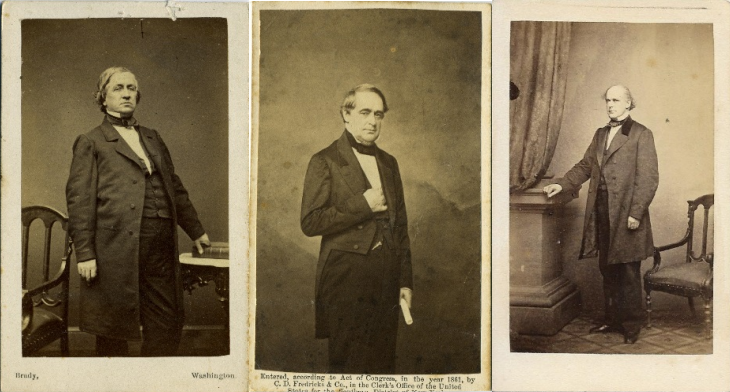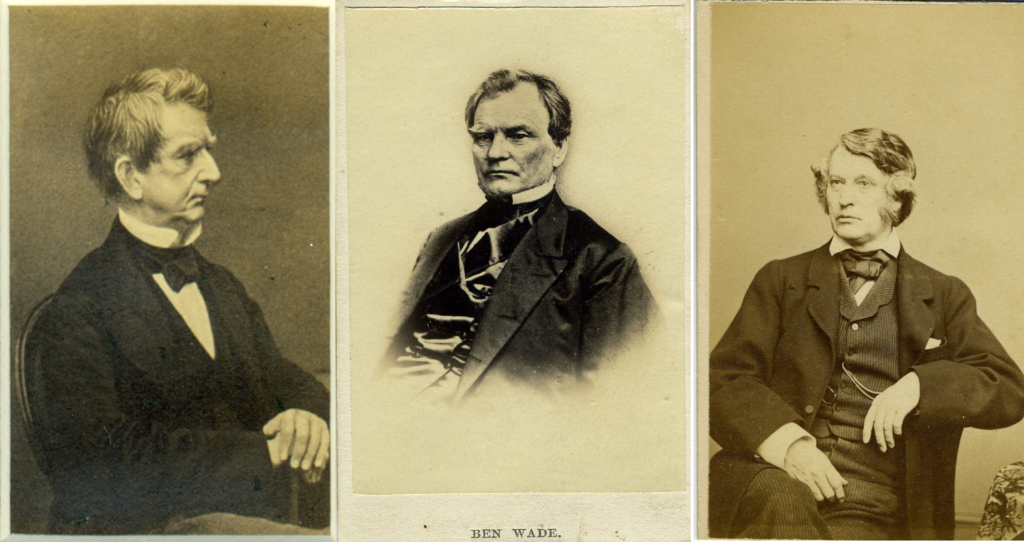Section #14 - Anti-Slavery sentiment grows due to the Fugitive Slave Act and Uncle Tom’s Cabin
Chapter 166: Whigs Suffer Losses In Mid-Term Elections
Spring 1851
Whigs Continue To Fade As A Political Force
Millard Fillmore’s optimistic prediction about domestic tranquility comes up against contrary public opinions in the mid-term elections for the 32nd Congress.
The results in the House show accelerating slippage for the Whigs, who give up a total of twenty-two seats – mostly to the Democrats.
Gerrit Smith’s abolitionist Liberty Party vanishes for good, and the Free Soilers surrender five-seat.
Election Trends In The U.S. House
| Party | 1844 | 1846 | 1848 | 1850 |
| Democrats | 142 | 112 | 113 | 130 |
| Whigs | 79 | 116 | 108 | 86 |
| American | 6 | 1 | 1 | 0 |
| Free Soil | 9 | 4 | ||
| Unionist | 10 | |||
| States’ Rights | 3 | |||
| Upcoming Congress | 29th | 30th | 31st | 32nd |
| President | Tyler | Polk | Polk | Fillmore |
The most noteworthy shift occurs in the South where a new Unionist Party wins ten seats. It is formed to defend slaver-holder rights without abandoning the Union. Six of the ten seats are won in Georgia, along with three in Mississippi and one in Alabama.
House Trends In Georgia
| Party | 31st | 32nd | Change |
| Democrats | 5 | 0 | (5) |
| Whigs | 3 | 0 | (3) |
| Unionist | 0 | 6 | +6 |
| States’ Rights | 0 | 2 | +2 |
A second southern initiative, the more strident States Rights Party, captures two seats in Georgia and one in Mississippi, the latter going to its leader, Albert Brown, who calls for the unfettered expansion of slavery, not only into the Mexican Cession lands, but also into Cuba and Central America.
In the House, the margin enjoyed by the Free States of the North continued to edge upward.
Division Of Seats In The House
| Years | Free States | Slave States |
| 1800 | 77 | 65 |
| 1810 | 105 | 81 |
| 1820 | 123 | 90 |
| 1830 | 142 | 100 |
| 1840 | 141 | 91 |
| 1850 | 143 | 90 |
As usual, the Senate races exhibit much less volatility – with the Whigs losing two seats and the Democrats and Free Soilers adding one apiece.
Election Trends In The U.S. Senate
| Party | 1844 | 1846 | 1848 | 1850 |
| Democrats | 34 | 38 | 35 | 36 |
| Whigs | 22 | 21 | 25 | 23 |
| Free Soil | 2 | 3 | ||
| Other | 1 | |||
| Vacant | 2 | |||
| Upcoming Congress | 29th | 30th | 31st | 32nd |
| President | Tyler | Polk | Polk | Fillmore |
April 1851
Abolitionists Sumner And Wade Enter Congress
The tenor of the chamber, however, is about to change with two new additions who will have a profound effect on the sectional frictions related to slavery in the years to follow.
The first is the Free Soiler, Charles Sumner of Massachusetts, whose cutting tirades on behalf of abolition will shake the future decorum in the upper chamber and lead to physical violence on the floor.
He is joined by Ben Wade, an Ohio Whig and former law partner of Joshua Giddings, who, along with Thad Stevens, have led the abolition forces in the House.
With Sumner and Wade onboard, the Senate now includes a threshold of six prominent politicians ready to assert their moral opposition to slavery.
Key Senators Opposing Slavery On Moral Grounds (1850-51)
| Dates | Name | State | Party |
| 1847-53 | John P. Hale | NH | Free Soil |
| 1848-61 | Hannibal Hamlin | Maine | Democrat |
| 1849-55 | Salmon Chase | Ohio | Free Soil |
| 1849-61 | Henry Seward | NY | Whig/Rep |
| 1851-69 | Ben Wade | Ohio | Whig/Rep |
| 1851-74 | Charles Sumner | Mass | Dem/Rep |

